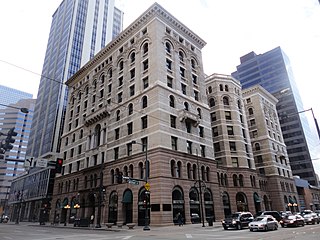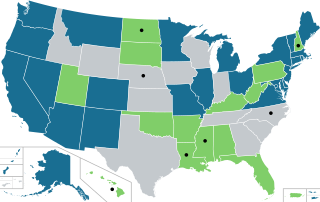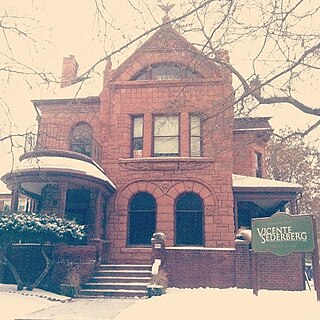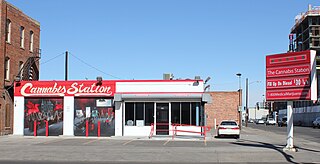
420, 4:20 or 4/20 is cannabis culture slang for marijuana and hashish consumption, especially smoking around the time 4:20 p.m. (16:20). It also refers to cannabis-oriented celebrations that take place annually on April 20.

In the United States, increased restrictions and labeling of cannabis as a poison began in many states from 1906 onward, and outright prohibitions began in the 1920s. By the mid-1930s cannabis was regulated as a drug in every state, including 35 states that adopted the Uniform State Narcotic Drug Act. The first national regulation was the Marihuana Tax Act of 1937.
Sal Pace is an American politician and marijuana advocate who served as a member of the Colorado House of Representatives, where he represented House District 46, which includes western Pueblo, Colorado from 2008 to 2012. During his time at the state house, Pace served as the Colorado House minority leader. In 2012, he ran against incumbent congressman Republican Scott Tipton in Colorado's 3rd Congressional District, although Tipton was ultimately re-elected. He then served as a County Commissioner of Pueblo County, Colorado until 2019.

In Colorado, cannabis has been legal for medical use since 2000 and for recreational use since late 2012. On November 7, 2000, 54% of Colorado voters approved Amendment 20, which amended the State Constitution to allow the use of marijuana in the state for approved patients with written medical consent. Under this law, patients may possess up to 2 ounces (57 g) of medical marijuana and may cultivate no more than six marijuana plants. Patients who were caught with more than this in their possession could argue "affirmative defense of medical necessity" but were not protected under state law with the rights of those who stayed within the guidelines set forth by the state. The Colorado Amendment 64, which was passed by voters on November 6, 2012, led to recreational legalization in December 2012 and state-licensed retail sales in January 2014. The policy has led to cannabis tourism. There are two sets of policies in Colorado relating to cannabis use: those for medicinal cannabis and for recreational drug use along with a third set of rules governing hemp.

Andrews, Jaques & Rantoul was an American architectural firm founded in Boston, Massachusetts in 1883 and composed of architects Robert Day Andrews, Herbert Jaques and Augustus Neal Rantoul. The firm, with its successors, was in business continuously from 1883 to 1970, for a total of eighty-seven years of architectural practice.

In the United States, cannabis is legal in 38 of 50 states for medical use and 24 states for recreational use. At the federal level, cannabis is classified as a Schedule I drug under the Controlled Substances Act, determined to have a high potential for abuse and no accepted medical use, prohibiting its use for any purpose. Despite this prohibition, federal law is generally not enforced against the possession, cultivation, or intrastate distribution of cannabis in states where such activity has been legalized. On May 1, 2024, the Associated Press reported on plans by the Drug Enforcement Administration to move marijuana to the less-restrictive Schedule III.

Colorado Amendment 64 was a successful popular initiative ballot measure to amend the Constitution of the State of Colorado, outlining a statewide drug policy for cannabis. The measure passed on November 6, 2012, and along with a similar measure in Washington state, marked "an electoral first not only for America but for the world."
The Colorado Compassion Club was a medical marijuana dispensary in Colorado. It was founded in 2004, opened a storefront in 2005 and registered with the Colorado Secretary of State in 2006 making it the first medical marijuana dispensary in the state of Colorado. This planted the seed in Colorado that grew into the first state to legalize recreational use by the Colorado Amendment 64 on November 6, 2012 along with the state of Washington.

The legal history of cannabis in the United States began with state-level prohibition in the early 20th century, with the first major federal limitations occurring in 1937. Starting with Oregon in 1973, individual states began to liberalize cannabis laws through decriminalization. In 1996, California became the first state to legalize medical cannabis, sparking a trend that spread to a majority of states by 2016. In 2012, Washington and Colorado became the first states to legalize cannabis for recreational use.

John James Huddart, known usually as John J. Huddart, was a British born and trained architect who practised out of Denver, Colorado in the United States. At the end of the Nineteenth century he was one of Denver's leading architects, known for his work on public buildings and as a courthouse architect.
The Task Force on the Implementation of Amendment 64 was a task force of the U.S. State of Colorado charged with considering and resolving a number of policy, legal and procedural issues relating to Colorado Amendment 64, which allows for personal use and regulation of marijuana.
Charles Boettcher was a successful businessman in Colorado in the hardware, mining, cement and sugar beet businesses. He was one of the founders of the Ideal Cement Company. Born in Kölleda, Kingdom of Prussia, he came to the US at age 17 and worked with his brother Herman, first in Wyoming. He moved to Colorado and pursued various business projects, often partnering with John F. Campion. His family fortune has funded many philanthropic enterprises. Charles Boettcher, Sr. not to be confused with his grandson with the same name Charles Boettcher II.
The following is a timeline of the history of the city of Colorado Springs, Colorado, USA.
Brian Vicente is an American attorney and marijuana rights advocate. He is a partner and founding member of Vicente LLP, which Rolling Stone has labeled "the country's first powerhouse marijuana law firm." Vicente was one of the primary authors of Colorado Amendment 64 and was co-director of the successful 'Yes on 64' campaign in 2012, which resulted in Colorado becoming the first state in the world to make the possession, use, and regulated distribution of marijuana legal for adults.

Vicente LLP, formally known as Vicente Sederberg, is an American cannabis law firm headquartered in Denver, Colorado that represents clients in the cannabis and psychedelics industries, and works on state and local cannabis policy reform. Since 2019, the firm has been nationally recognized by Chambers and Partners as one of seven Band 1 Law firms in the US practicing cannabis law.

Cannabis dispensaries in the United States or marijuana dispensaries are a type of cannabis retail outlet, local government-regulated physical location, typically inside a retail storefront or office building, in which a person can purchase cannabis and cannabis-related items for medical or recreational use.
The Neighborhood-Supported Cannabis Consumption Pilot Program Initiative (I-300), more commonly known as the Denver Initiative 300 or the Social Pot Use Initiative, allows for limited public consumption of cannabis within the city limits of Denver, Colorado. This ballot initiative was passed by voters on November 8, 2016 by a 53.57% to 46.43% margin. Initiative 300 is a pilot program which will sunset in 2020 unless extended by city council or an additional voter initiative.
Rachel K. Gillette is an American attorney who specializes in law relating to marijuana and the cannabis industry. Gillette is based in Lafayette, Colorado. As a lawyer, she is licensed to practice law in Colorado and Connecticut.
Wanda L. James is the first African American woman to own a marijuana dispensary in the United States.












